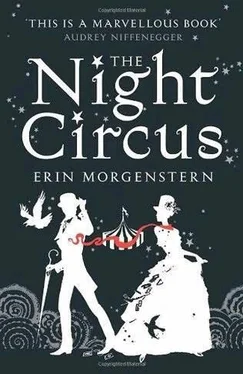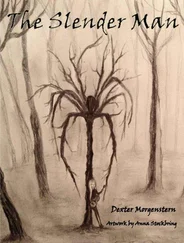“And how many of your own students have chosen to end the game themselves?” the man in the grey suit asks, turning back. “Seven? Will your daughter be the eighth?”
“That is not going to happen again,” Hector responds, each word sharp and heavy despite his insubstantial form.
“If she wins, she will hate you for it if she does not already.”
“She will win. Do not try to avoid the fact that she is a stronger player than yours and always has been.”
The man in the grey suit lifts a hand in the direction of the bonfire, amplifying the sound that echoes from beyond the courtyard so that Hector can hear his daughter, repeating Friedrick’s name over and over in increasing panic.
“Does that sound like strength to you?” he asks, dropping his hand and letting Celia’s voice blend into the din of the crowd.
Hector only scowls, the flames of the bonfire further distorting his expression.
“An innocent man died here tonight,” the man in the grey suit continues. “A man your player was quite fond of. If she had not already begun to break, this will do it. Was that what you meant to accomplish here? Have you learned nothing after so many competitions? There is never any way to predict what will come to pass. No guarantees on either side.”
“This isn’t over yet,” Hector says, vanishing in a blur of light and shadow.
The man in the grey suit walks on as though he had not paused, making his way through the curtains of velvet that separate the courtyard from the world outside.
He watches the clock by the gates for some time before he departs the circus.
Beautiful Pain: LONDON, NOVEMBER 1, 1901
Marco’s flat was once plain and spare but now it is crowded with an assortment of mismatched furniture. Pieces that Chandresh became bored with at one point or another and were adopted into this purgatory instead of being discarded entirely.
There are too many books and not enough shelves to hold them, so they sit piled on antique Chinese chairs and sari-wrapped cushions.
The clock on the mantel is a Herr Thiessen creation, adorned with tiny books flipping through their pages as the seconds tick toward three o’clock in the morning.
The larger books on the desk are moving at a less steady pace as Marco goes back and forth between handwritten volumes, scrawling notes and calculations on loose sheets of paper. Over and over he crosses out symbols and numbers, discards books in favor of others, and then returns to the discarded ones again.
The door of the flat opens of its own volition, locks falling open and hinges swinging wildly. Marco jumps from his desk, spilling a bottle of ink across his papers.
Celia stands in the doorway, stray curls escaping her upswept hair. Her cream-colored coat hangs unbuttoned, too light for the weather.
Only when she moves into the room, the door closing automatically and locking with a series of clicks behind her, does Marco notice that beneath her coat her gown is covered with blood.
“What happened?” he asks, the hand that had been moving to right the bottle of ink halting in midair.
“You know perfectly well what happened,” Celia says. Her voice is calm but already the ripples are beginning to form in the dark surface of the ink pooled on the desk.
“Are you all right?” Marco asks, trying to move closer to her.
“I most certainly am not all right,” Celia says, and the bottle of ink shatters, raining ink over the papers and splattering Marco’s white shirtsleeves, falling into invisibility on his black vest. His hands are covered in ink but he is still distracted by the blood on her gown, scarlet screaming across the ivory satin and vanishing behind the black velvet fretwork that covers it like a cage.
“Celia, what did you do?” he asks.
“I tried,” Celia says. Her voice breaks on the word so that she has to repeat herself. “I tried. I thought I might be able to fix it. I’ve known him so long. That maybe it would be like setting a clock to make it tick again. I knew exactly what was wrong but I couldn’t make it right. He was so familiar but it… it didn’t work.”
The sob that has been building in her chest escapes. Tears that she has been holding back for hours fall from her eyes.
Marco rushes across the room to reach her, pulling her close and holding her while she cries.
“I’m sorry,” he says, repeating it in a litany over her sobs until she calms, the tension easing in her shoulders as she relaxes into his arms.
“He was my friend,” she says quietly.
“I know,” Marco says, wiping away her tears and leaving smudges of ink across her cheeks. “I am so sorry. I don’t know what happened. Something threw off the balance and I cannot figure out what it was.”
“It was Isobel,” Celia says.
“What?”
“The charm Isobel put over the circus, over you and me. I knew about it, I could feel it. I didn’t think it was doing much of anything but apparently it was. I don’t know why she chose tonight to stop.”
Marco sighs.
“She chose tonight because I finally told her that I love you,” he says. “I should have done it years ago, but I told her tonight instead. I thought she took it well but clearly I was wrong. I haven’t the slightest idea what Alexander was doing there.”
“He was there because I invited him,” Celia says.
“Why would you do that?” Marco asks.
“I wanted a verdict,” she says, tears springing to her eyes again. “I wanted this to be over so I could be with you. I thought if he came to see the circus that a winner could be determined. I don’t know how else they expect it to be settled. How did Chandresh know he would be there?”
“I don’t know. I don’t even know what possessed him to go there, and he insisted that I not accompany him so I followed him instead, to keep an eye on him. I only lost track of him for minutes when I went to speak with Isobel and by the time I caught up with him again… ”
“Did you feel as though you had the ground removed from beneath you as well?” Celia asks.
Marco nods.
“I was trying to protect Chandresh from himself,” he says. “I had not even considered he might be a danger to anyone else.”
“What is all this?” Celia asks, turning her attention to the books on the desk. They contain endless pages of glyphs and symbols, ringed in text ripped from other sources, affixed to one another and inscribed over and over. In the middle of the desk there is a large leather volume. Pasted inside the front cover, surrounded by an elaborately inscribed tree, Celia can barely make out something that must once have been a newspaper clipping. The only word she can discern is transcendent .
“This is how I work,” Marco says. “That particular volume is the one which binds everyone in the circus. It’s the safeguard, for lack of a better term. I placed a copy of it in the bonfire before the lighting, but I’ve made adjustments to this one.”
Celia turns through the pages of names. She pauses at a page that holds a scrap of paper bearing the looping signature of Lainie Burgess, next to a space where an equal-sized piece has been removed, leaving only a bright blank void.
“I should have put Herr Thiessen in there,” Marco says. “I never even thought of it.”
“If it had not been him it would have been another patron. There is no way to protect everyone. It’s impossible.”
“I am sorry,” he says again. “I did not know Herr Thiessen as well as you, but I did admire him and his work.”
“He showed me the circus in a way I had not been able to see it before,” Celia says. “How it looked from the outside. We wrote letters to each other for years.”
Читать дальше












